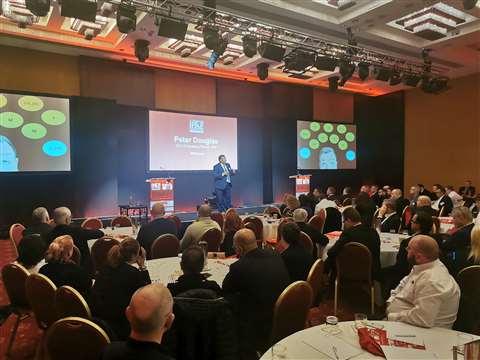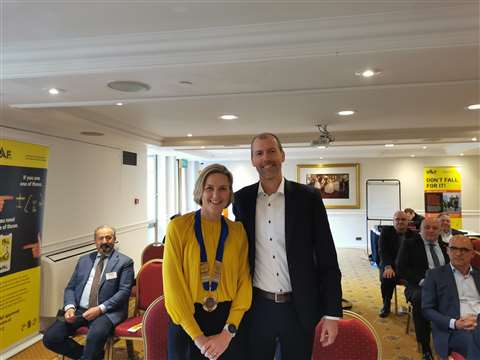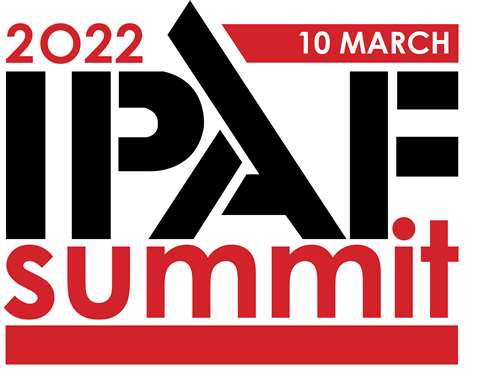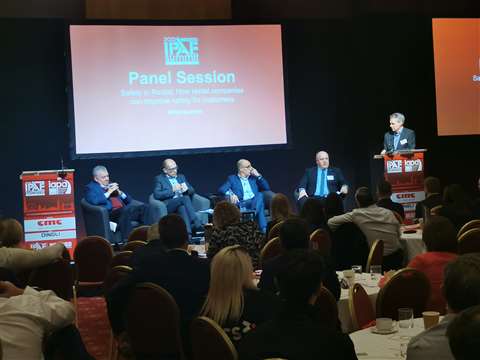IPAF Summit discusses safety
12 March 2022
Around 350 attendees at the 2022 Summit of the International Powered Access Federation (IPAF), at the Millennium Gloucester Hotel, Kensington, London, on 10 March 2022, heard presentations on the theme of “The Evolution of Safety”.
 IPAF CEO and managing director Peter Douglas speaks at the Summit.
IPAF CEO and managing director Peter Douglas speaks at the Summit.
The IPAF Summit 2022 marked a return to in-person global events for IPAF and event partners KHL – and marked the first time the event has been held in the UK since 2017.
It was followed in the evening by the International Awards for Powered Access (IAPAs), at which the winners of 13 categories were announced in front of a record audience of 450 industry professionals.
In addition to the Summit, IPAF held its AGM on the same morning (10 March), at which the association announced its annual report and confirmed Karin Nars as its new president.
Hosted by UK television presenter Mark Durden-Smith, the Summit considered how, in the ten years since IPAF started its accident reporting project, our industry has witnessed advances in technology, training and regulation to provide a safer working environment for operators. The project has been central to many changes within the industry including influencing training programmes, guiding standards, and informing good practice guidance.
New IPAF President announced
 Karin Nars is announced as the new president of IPAF, with former president Norty Turner.
Karin Nars is announced as the new president of IPAF, with former president Norty Turner.
First up was Peter Douglas, IPAF CEO & MD, who took the stage to welcome the attendees to the first in-person Summit of his tenure, despite him taking up the post at the end of 2019, as result of the Covid-19 pandemic.
Douglas thanked Norty Turner, outgoing IPAF President, paying tribute to his guidance over his extended two-and-a-half-year term in the office. Turner said, “Something happens, when we come together – something chemical, so it is fantastic to see all these smiling faces, as everybody is happy to be together at this, the most well-attended Summit & IAPAs ever, because everyone is so please to be together again.”
Steering the subject to IPAF’s new president Karin Nars, Turner added, “I want to welcome Karin Nars as president – the first woman president, and the first president who is the offspring of a former president – she is a pioneer. Welcome to the role, you are going to do a fantastic job.” See Nars’ comments at the end of this article.
Accident reporting
Mark Keily, SHEQ Director at Sunbelt Rentals and Chair of the IPAF International Safety Committee, then took to the stage with Brian Parker, IPAF Head of Safety & Technical, to speak about IPAF accident reporting. “It’s a sad fact that back in the 1930s, people went to work at height – for instance building the Rockefeller Centre in 1932 – in the knowledge it was a high-risk occupation and there was a good chance they might not go home safely at the end of their shift,” opened Mark. “Fast forward 90 years and things have changed so much, though we are no doubt still just a point in time in the evolution of safety, and who knows, people may look back from the future on the way we did things in 2022 and say ‘look how far we have come since then’.”
He talked about the establishment of the new IPAF International Safety Committee (ISC), and how pleased he is as chair that the committee has truly worldwide representation on the ISC following a fantastic response from our members wanting to join. He added, “The more accident reporting we can drive, the more data we can gather, that will help us in our ultimate aim of making all of our workplaces safer, and to ensure that all of our people get to go home safely at the end of each day.”
Brian Parker challenged the room to consider how valuable reporting of near misses and instances of unsafe conditions can be, pointing out that for every fatality or serious injury, there will have been thousands of unsafe behaviours or near-misses that have typically gone un-reported. The IPAF reporting portal is an important way of gathering accident data across the world.
At the Summit Parker launched IPAF’s 2022 safety campaign Don’t Fall For It, based on falls from the platform, which over the last six years has been the main cause of serious injuries and deaths, at an average of 17% of all reported incidents on the portal. Within that, a staggering 70% of falls were from overreaching, with 7% down to technical failure, 5% due to standing on guardrails, and 4% a result of violation and behaviour – not following the rules. A further 11% was down to not knowing the rules and the need for pre-use inspections and checks.
Study of an accident
Madeleine Abas, Senior Partner at Osborn Abas Hunt, presented a fascinated case study of an accident. Beginning with the critical hours and minutes after an accident has occurred – the “golden hour”.

The first critical thing following an accident should be to make sure it is safe to act, said Abas, “I will never forget the first time I received a call to say there had been a fall from height, and that the first person on the scene to assist that person and retrieve the materials involved also fell, this time to their death. We need to ensure we have an emergency plan in place, that the area is safe, that the emergency services are informed and that the appropriate emergency response is in place and that they are practiced regularly so that if and when the procedure is needed it is put into practice and people are confident that they know what to do.”
Then it is important to take control of the scene, to investigate it properly, capture critical information. Abas added, “Have senior managers been informed? Do we have to notify relevant authorities in the event of an accident? Certainly in cases of fatalities, but often business leaders don’t know what is reportable and what isn’t – if you don’t report when you should it can be a criminal offence, but over-reporting when it isn’t obligatory is also not helpful.”
She also talked about legal privilege, and how to conduct both internal investigations and risk assessments. “Don’t focus on what went wrong, but emphasis all the good things that could have been done to prevent an accident occurring. The same principle applies to risk assessment – it is an exercise in thinking forward, to consider all the things that could go wrong, and make sure all the things we have in place to prevent it from occurring, and also ask ourselves, ‘what more could we do to prevent this happening?’
Manufacturers’ perspective
Remi Heidelberger, Group Product Marketing Manager at Haulotte Group, gave an equipment manufacturer’s perspective on designing for safety, focusing on key innovations across the Haulotte product range, and how they fit into the company’s long-standing goal to be the manufacturer of the “safest powered access equipment in the world”.
Heidelberger said, “Safety is in our DNA – we have no choice. Building a safe machine is not enough, we have to encourage safe practice and make this part of the way the industry operates. He talked about developing secondary guarding systems and how manufacturers can contribute to wider safety issues in and around their machines.”
Following up from the manufacturer perspective was Jonathan Dawson, Managing Director of Power Towers, part of JLG, who discussed safety improvements in the industry and in particular safety at height under 6m.
The A-frame ladder still works and hasn’t changed much since it was patented in the 1880s, Dawson pointed out, but in a workplace environment, and when employers have a duty of care, there are safer and more versatile solutions available.
Musculoskeletal disorders are estimated to cost the UK construction industry 5 million hours and £1billion per year, so adjustable low-level access platforms are quicker, “and if you work smarter, you tend to work safer as well,” said Dawson.
He added that we need to make equipment delivery and portability easier, drive more sharing between contractors and trades on sites in terms of both financial savings and from a sustainability angle. In addition, Dawson pointed out that we need to make familiarisation and equipment training more straightforward in comparison to ladders or scaffold tower.
Safe behaviour
Dr Shaun Lundy, Director of Strategy and Innovation at Tetra Consulting, presented on safety and behaviour in, “A changing workforce and what it means for safety”.
Innovation in health & safety thinking is a sure way to reduce incident rates, which remain stubbornly high, said Lundy. Embracing generational diversity, new technology and understanding the negative effects of national skills shortages and emerging risks are all key, he said.
In future there should and will be an increasing focus on well-being and mental health, as well as a business and professional ethics consideration rather than a regulatory or legislative onus on safety.
Lundy said people are solutions not part of the problem. We should focus on positives over negatives, and ethics over bureaucracy. “We need to think about why we are doing things, we need to focus on all risks equally, and not allow the preponderance of minor risks to leave a blind spot over major risks.”
Lundy added that engaging people and having a good leadership culture are key. “It’s often the leader that gets the credit, but often it is those first few followers that go with them that help to make their leadership successful. You want exemplary followers, not alienated, conformist or passive ones.”
What really matters most is starting conversations and encouraging engagement, says Lundy. “We want to avoid ‘groupthink’ and be more open and democratic in our approach.”
Safety and storytelling
After lunch, Oana Samoila, Key Accounts Sales Manager at Italian manufacturer AlmaCrawler, gave a thought-provoking insight into the way the human mind learns in “Safety and Storytelling; pointing out how people learn through a mix of visual, auditory and kinaesthetic methods. Samoila asked why storytelling is so important to training and safety.
When telling a story, the listener is instinctively trying to make sense of what they are being told. Without storytelling, the human brain often finds it difficult to put the listener into the context being explained, which makes retaining information, such as safety guidance or training instruction much harder.
Giving information in a way that makes it more relatable helps retention and lends the information a significance that mere facts or rote learning does not. Storytelling also provides an opportunity for risk-free experimentation, allowing people to enter scenarios and consider “what would you have done?”
In short, storytelling creates engagement, promotes retention and recovery
Contractor insights
Martin Hall, Health & Environment Director at contractor Morgan Sindall-Safety, gave a talk entitled “Safety: A contractor’s view.” He covered the myriad challenges he has as a contractor, including dropped objects, combating poor safety practices on sites, and problems with “skill fade” even among trained, experienced operators and supervisors.
He talked about how the industry can adopt and ideally exceed “minimum standards” of safety. Another key point is that many users still struggle to accurately assess risk, and especially experienced operators who feel that “common accidents cannot happen to them”.
Hall focused on the risks of dropped objects and materials, including properly designed exclusion zones. He added, “Rather than zero accidents we are shifting the emphasis on to 100% safe.” And the innovation from the wider powered access industry is very inspirational he concluded.
Reporting benefits
Paul Roddis, IPAF Training Manager, gave a timeline of developments in IPAF training, highlighting the acceleration in output of new training course and digital innovations over the past few years, particularly during the pandemic when convenience, flexibility and remote learning all helped increase uptake of IPAF’s global training offering.
He explained how important the IPAF Accident Reporting portal and the data gathered has been in helping to direct resources and influence the content of all of the training updates in recent years. He said IPAF needs to “change people’s mindset” when it comes to familiarisation, as it is fundamental to safety and teaches valuable knowledge that can’t be imparted via standardised operator training.”
He reserved special praise for the new ePAL mobile app for operators and managers, launched last year and described it as “perhaps the greatest innovation IPAF has ever introduced”.
The challenges that remain for IPAF training include keeping abreast of changes and updates across 63 variations of the IPAF operator course in 14 different languages, against a backdrop of strong and sustained growth in demand over the past ten years. Another key challenge is replicating that growth for operator training when it comes to the IPAF MEWPs for Managers course.
He gave examples of trained operators doing it wrong, and managers not knowing it was wrong, and trained operators pointing out errors in planning and management, and not being listened to. “Clearly, we are never going to hit our goal of zero falls, unless we act on this issue,” he concluded. “We need everyone, rental companies, training firms, operators, managers and ultimately contractors, to train their people properly.”
Panel discussion 2022
 IPAF Summit panel discussion
IPAF Summit panel discussion
The panel discussion, hosted by KHL events director Murray Pollok, saw four rental company leaders discuss safety in the rental sector. Pedro Torres, CEO of Riwal, said, “We have safety KPIs, weekly meetings where we talk safety, we have safety legislation, and we also have a matrix of safety escalations – but we try and attach a value to safety, because in the end, we rent safety, we don’t just rent machines. We need to improve near miss reporting and in fact the numbers across accident reporting from all countries where we operate.”
Andy Studdert, ex IPAF President and CEO, said, “We have to remember that the culture of work is changing all the time; a lot of people coming into our industry over the past ten years have a different ethic – and we have to remember that society is shifting and we have to change the message and the way we say it accordingly.”
Paul Rankin, Powered Access Division, Chief Operating Officer at LOXAM, commented, “An open environment is key, and if speaking out as an operator reaches the point where it is considered as whistle-blowing, then we as managers, as individuals, need to realise the culture we have created is wrong”; and Will Temple, Head of Powered Access, Sunbelt Rentals, pointed out, “You need to create an environment of communication and trust – it starts with senior management, who need to walk the walk. When you see managers properly engaging on safety, it is really important – if you don’t align with safety policy on the ground, you won’t achieve what you are trying to.”
Taking questions from the audience, the panel was asked, “if you could change just one thing, what would it be? Rankin said, “a fundamental problem for me is that you can do your training one day on a smaller boom lift and the next day be on a 40m-plus machine? We need to look at this issue and what we can do to address this?”
Temple pointed to training of competence. He said, “There is too much on training, not enough on demonstrating competence. How many logbooks are being completed and checked? I think we would be disappointed.”
Torres said, “I think we should put awareness of accidents, information to companies, to CEOs about accidents in their country or region, to build awareness and engagement.”
Studdert added, “I would agree that we need to have segregated training requirements when you rent different times of machine. But a wider issue would be the problems in our industry that haven’t improved in years, decades even. For me such an issue is the use of the harness. We need to focus on the first thing, the biggest priority, and fix it, and then move on to the next one.”
IPAF President summary
Dinolift’s Karin Nars, newly confirmed president of IPAF, closed the conference. “We should all take pride in being a global organisation, committed to improving safety in our industry – we should never lose sight of who we are.
“I am the first female President of IPAF, and my father was also president and he always taught me to believe in myself and follow my dreams. I want IPAF to launch a programme that champions equal opportunities for everyone, and I will use my voice to promote such a programme.
“I have learned that we should always recognise the positive things we have done in our industry and celebrate these. We are all ambassadors for safety.”
STAY CONNECTED



Receive the information you need when you need it through our world-leading magazines, newsletters and daily briefings.
CONNECT WITH THE TEAM







